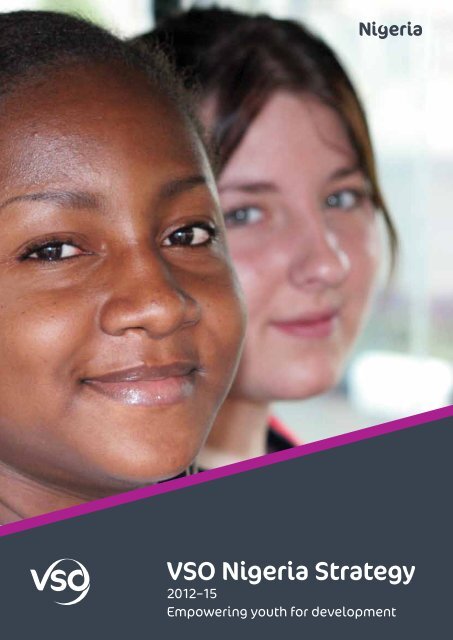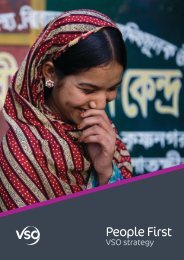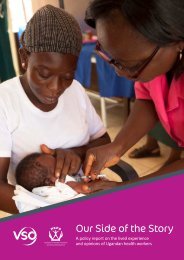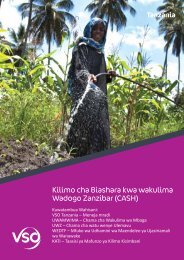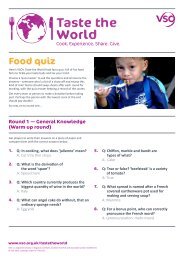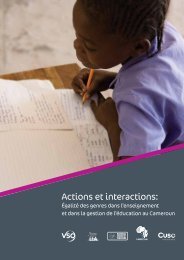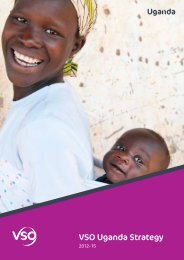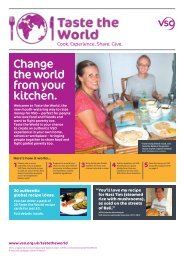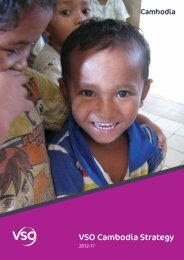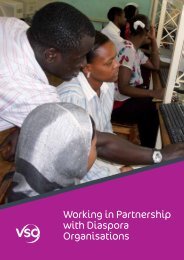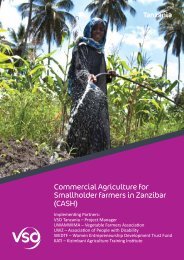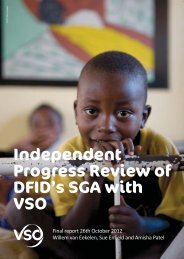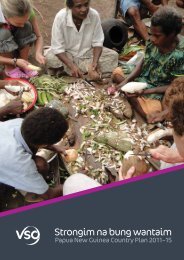VSO Nigeria Strategy
VSO Nigeria Strategy
VSO Nigeria Strategy
Create successful ePaper yourself
Turn your PDF publications into a flip-book with our unique Google optimized e-Paper software.
<strong>VSO</strong> <strong>Nigeria</strong> <strong>Strategy</strong> 2012–15<strong>VSO</strong> <strong>Nigeria</strong> <strong>Strategy</strong>2012–15Empowering youth for development
<strong>VSO</strong> <strong>Nigeria</strong> <strong>Strategy</strong> 2012–15ContentsForeword 3Our vision 4Quick facts 4Where we work 4The context in <strong>Nigeria</strong> 5Who we work for 5Key outcomes 6Partnership: the way we work 7Key volunteering skills needed 7Implementation through volunteers 7Photography: ©<strong>VSO</strong>/Jika Amah©<strong>VSO</strong>©<strong>VSO</strong>2
<strong>VSO</strong> <strong>Nigeria</strong> <strong>Strategy</strong> 2012–15Foreword<strong>VSO</strong> is the world’s leading independent internationaldevelopment organisation that works through volunteersto fight poverty in developing countries. <strong>VSO</strong>’s high-impactapproach involves bringing people together to share skills,build capabilities, promote international understanding andaction, and change lives to make the world a fairer place.In <strong>Nigeria</strong>, our unique, but not exclusive, contribution is toidentify and work in emergent areas using highly qualifiedvolunteers to address poverty and the marginalisation ofyouth in an holistic way.What <strong>VSO</strong> doesWork together: Our volunteers and programme staff workwith partner organisations involved in education, securelivelihoods and citizen engagement, to build capacity (atindividual, organisational and institutional levels) throughtransferring knowledge and experience. Our local partnersuse their skills, experience and cultural understanding tomake an impact in their own communities.Knowledge sharing: To address knowledge gaps, wefacilitate knowledge exchange visits and linkages betweenpartners (domestically and regionally). Through workshops,conferences and national and international exchanges weconnect individuals and organisations so that they can shareknowledge, perspectives, ideas and practices. This providesaccess to knowledge for those who are often excluded.Advocacy: We conduct research; pilot and evaluateinnovative approaches; give a voice to our beneficiariesand bring knowledge to those responsible for decidingon and implementing policy.How we do itOur efforts focus on increasing the impact of existinggovernment and civil society development efforts tostrengthen organisational and human capacities. We workalongside our partners, volunteers and ultimate beneficiariesin a consultative, inclusive and respectful manner in all stagesof programme design, monitoring and evaluation becausesustainability, empowerment and capacity building are ouroverarching goals. The work and ambition outlined in thisplan recognises and appreciates existing accomplishmentsand shows our commitment to ongoing consultationand collaborative implementation.3
<strong>VSO</strong> <strong>Nigeria</strong> <strong>Strategy</strong> 2012–15Our visionWe know that youth, not oil, will be <strong>Nigeria</strong>’s most valuableresource in the 21st century. 1 <strong>VSO</strong> <strong>Nigeria</strong> has a vision thatguides our country strategy:We envision a society where young <strong>Nigeria</strong>n men and women– who comprise 70% of the population – are leading healthy,productive and dignified lives; contributing meaningfully tonational economic and social development; and participatingactively in peaceful, democratic governance.Our new vision is a society where the innovative energyof youth is harnessed for social justice in <strong>Nigeria</strong> andfor a world without poverty.(employment/self-employment) through skills transferand vocational training. We also build this capacitythrough improving the quality of, and access to, educationfor children and youth. We engage youth as active citizensin their own development through leadership training– mainstreaming gender equality and promoting peace,reconciliation and advocacy directed towards a youthresponsivepolicy environment.Our key priority is to operate youth-centred integratedprogrammes to promote the productive engagementof youth in the peaceful development of <strong>Nigeria</strong>.We build the capacity of civil society and governmentpartners and stakeholders to contribute to youth livelihoods1. British Council, Harvard School of Public Health, Next Generation <strong>Nigeria</strong>, 2010Quick factsPopulation: Africa’s most populous state with over158 million people.Education: <strong>Nigeria</strong> has 10% of the world’s children out ofschool with 37% of the population having no formal schooling.Health: <strong>Nigeria</strong> accounts for 10% of the world’s child andmaternal death rates, the highest in Africa.Where we workWe focus in four geographic clusters: the north-west is a clusterof three states – Kaduna, Kano, and Jigawa; the north-centralis a cluster of three states – FCT, Nassarawa and Kwara; thesouth-south is Cross River State; and the south-west is LagosState. The added value of working in geographical clustersenables volunteers to be grouped. Partners can also interactand engage with each other more readily.Youth: Seventy per cent of <strong>Nigeria</strong>ns are under 35 yearsof age with a median age of 18.5 years.Economy: More than 100 million <strong>Nigeria</strong>ns (64%) live onless than £GB1 a day, with 33.9% of the population livingin severe poverty.43Unemployment: More than 30% of <strong>Nigeria</strong>ns under 35 yearsold are unemployed, with young women in this sectorlagging far behind.1657Gender: <strong>Nigeria</strong> ranks as one of the lowest in the worldon the Gender Inequality Index.281. Kwara2. Lagos State3. Jigawa4. Kano5. Kaduna6. FCT7. Nassarawa8. Cross River State4
<strong>VSO</strong> <strong>Nigeria</strong> <strong>Strategy</strong> 2012–15The context in <strong>Nigeria</strong><strong>VSO</strong> has operated across <strong>Nigeria</strong> since 1958 and hasaccompanied the country through complex social changeand growth, as well as local conflict and instability. <strong>Nigeria</strong> iscurrently deemed a conflict affected and fragile state, definedby the UK Department for International Development (DFID)as a state where: “the government is unable/unwilling toprovide core functions including service entitlement, justiceand security”. 2 It is a country rich in oil and other natural andhuman resources yet remains developmentally poor. Manyparts of <strong>Nigeria</strong> are peaceful. However, poverty and frustrationhave pushed predominantly young men in some northernstates and the Niger Delta towards extremism and violence.There are opportunities for change. <strong>Nigeria</strong>n youth areharnessing new technologies, raising their voices and joiningtogether to demand a stable, better-governed, genderequitableand peaceful <strong>Nigeria</strong>.Who we work for<strong>VSO</strong> <strong>Nigeria</strong> works with poor and marginalised young menand women in an integrated way. We shape our responsesbased on the needs and priorities they identify. We relateto youth as both ultimate beneficiaries, as well as some ofour key implementers in bringing about positive change.We focus on school children (boys and girls), adolescentgirls and boys (10-19 years old) and young men and women(20-35 years old).We recognise that the social groups ‘youth’ and ’children’are not homogenous but rather significantly impactedby gender, geography, disability and educational accessopportunities and constraints.Over 1,300 international <strong>VSO</strong> volunteers have workedin <strong>Nigeria</strong> since 1960. Our achievements include:• Our leadership on climate change – including a short-termplacement of a high-level political volunteer who built thecapacity of the climate change network to advocate moreeffectively on the Climate Change Bill.• Our leadership and innovation on disability in the areasof deaf education, HIV and AIDS and disability.• Over 1.5 million children and youth have benefitedfrom improved education as a result of teacher training,in-service training and community engagement(ultimate beneficiaries).• Over 300,000 people have been reached with HIVand AIDS prevention messaging and access to careand support (direct beneficiaries).• Over 250,000 people have been reached (directbeneficiaries) under our secure livelihoods programme –1.5 million people have been impacted indirectly throughadvocacy leading to policy change (ultimate beneficiaries).2. DFID Bilateral Aid Review: Technical Report, March 2011.‘Need-effectiveness’ encompasses level of poverty (for need)and the quality of the institutional environment5
<strong>VSO</strong> <strong>Nigeria</strong> <strong>Strategy</strong> 2012–15Key outcomesOur overarching goal is to reduce poverty and the vulnerabilityof youth in <strong>Nigeria</strong>.Outcome oneImproved capacity of civil society, government and privatesector stakeholders to enhance security of livelihoods andemployment opportunities for young men and women.We support youth-led or youth-serving partners to promoteyouth employment, and to promote young people’s entrancealong market value chains. Attention is given to identifyingbarriers and developing strategies to enable young women’sparticipation in business, especially at higher levels. Wesupport vocational skills training/apprenticeships especially foruneducated youth – equally important, we equip these youthwith accompanying life skills around sexual and reproductivehealth and HIV and AIDS prevention in a youth-friendly way.To stimulate pro-poor market chains, <strong>VSO</strong> <strong>Nigeria</strong> supportsproduct and other market-related research, encourages sociallyresponsible entrepreneurship to address social problems,provides technical assistance to formalise informal micro/smallindustries and facilitates access to micro-finance and othersupport services.Outcome twoImproved capacity of civil society and government educationpartners and stakeholders to deliver and make accessiblequality, inclusive education for children and youth.Outcome threeImproved capacity for knowledge and skills in advocacy andpolicy engagement to support social change, strengthenedorganisational development and gender-responsivenessof partners to deliver results.We promote opportunities for young people to expresstheir needs, demand their rights, and hold governmentaccountable (especially with respect to youth employmentand quality education). We seek opportunities to link withyouth-led or youth-serving advocacy organisations in raisingthe importance of these issues and promote and advocateon peace and reconciliation.In our targeted geographic clusters, we play a key role instrengthening networks and coalitions around issues of sharedconcern to civil society organisations, local government andother international non-governmental organisations (NGOs).Through the development of a gender equality strategy andaction plan, <strong>VSO</strong> <strong>Nigeria</strong> strengthens gender analysis to informour programming focus and that of our partner organisations.Overall, we seek to strengthen the organisational developmentof partners to practice transparency and accountability,which in turn leads to better promotion of the needs of thecommunities they represent.We also work with government and state institutions tofoster a receptive environment for issues brought forwardby civil society.Youth employability is linked to early education of childrenand appropriate vocational training – the capacity of teachersto teach effectively can, however, constrain quality education.Through international volunteers, we address some humanresources gaps in the education sector and build the capacityof tutors and students in institutions responsible for preserviceand in-service teacher training, inclusive of Islamyiaschools. We seek to strengthen oversight and supervision, andevidenced-based planning support through data collection.We also build the capacity of teachers to be more effective,including national volunteers.We work with civil society organisational partners and respondto their needs. We promote behavioural change throughcommunication and the dissemination of information topromote inclusive education, with particular emphasis on girls’education. We support vocational skills training for educatedyouth and offer accompanying life skills. Our InternationalCitizen Service (ICS) youth volunteers work with studentsto help lobby local government and relevant authorities forincreased teacher support, and more accessible education.6
<strong>VSO</strong> <strong>Nigeria</strong> <strong>Strategy</strong> 2012–15Partnership: the way we work<strong>VSO</strong>’s unique model of working through people bringssomething different to the table, alongside other internationalNGOs who contribute other resources. By working withinnational structures, our volunteers can help ensure lastingchange by engaging in real development through day-to-dayworkings with the people of <strong>Nigeria</strong>.We deeply value our existing partners and strive to strengthenthese relationships while also developing new partnershipsto achieve our objectives. We work at all levels of society toaddress issues in the most comprehensive way possible. Ourpartners include government partners, civil society partners,and other key stakeholders such as private enterprise, funders,networks and coalitions, professional associations andadvocacy institutions.Implementation through volunteersWe work with a range of different volunteers:National volunteers: Volunteerism is the backbone of manycommunities in <strong>Nigeria</strong>. We support community volunteersto improve food security and livelihoods and in turn, addressthe rural/urban migration of young people. Working with theNational Youth Service Corps (NYSC), we also place and supportyoung graduates to improve the quality of education in ruralcommunities and strengthen a culture of national volunteering.Long-term international volunteering (professionalplacements of up to two years): Our volunteers help buildsocial infrastructure by passing on their expertise. They comefrom both developing and developed countries.Short-term specialist assignments (positions of six monthsand under): Our experienced professionals provide supporton short-term assignments ranging from research studies andtraining seminars to exchange visits by members of parliament.Diaspora volunteers: We provide a mechanism for diasporamembers to give back to their country of origin in a meaningfuland targeted way.Youth volunteers: Through the DFID-sponsored InternationalCitizen Service (ICS) initiative we bring 18-25 year olds fromacross the UK to <strong>Nigeria</strong> for three-month placements. Throughthese placements, they can better appreciate the developmentchallenges facing <strong>Nigeria</strong> and work side-by-side with localcounterparts to help alleviate poverty.©<strong>VSO</strong>Corporate volunteers: We offer private companies a uniqueway to support international development efforts andencourage employee engagement opportunities.Key volunteering skills needed<strong>VSO</strong> <strong>Nigeria</strong> has an ongoing need for skilled,professional volunteers who contribute theirexpertise and experience in:Regional volunteers: We build on natural migrationpatterns within the Economic Community of West AfricanStates (ECOWAS) countries and offer opportunities forindividuals to contribute valuable time and gain professionalgrowth and experience.• teacher training and strengthening education systems• vocational training• organisational development and knowledgemanagement• youth entrepreneurship and business development• product research and marketing• information and communication technology(ICT) training7
<strong>VSO</strong> <strong>Nigeria</strong> <strong>Strategy</strong> 2012–15<strong>VSO</strong> <strong>Nigeria</strong>PO Box 2452, GarkiAbuja<strong>Nigeria</strong>vsonigeria@vsoint.org<strong>VSO</strong> InternationalCarlton House, 27a Carlton DriveLondon SW15 2BS, UK+44 (0)20 8780 7500www.vsointernational.orgPublished September 2012


